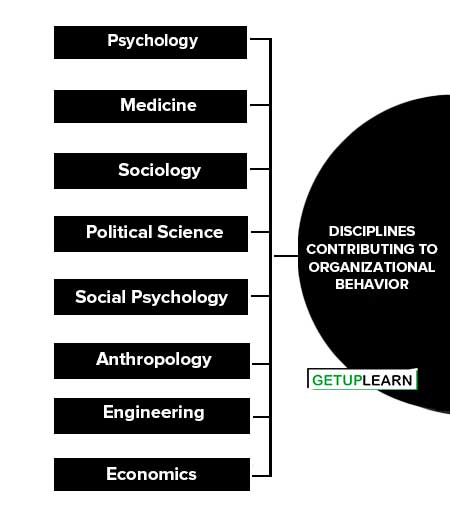OB draws various concepts and principles from behavioral sciences and some other core disciplines of behavioral sciences i.e. psychology, sociology, and anthropology. Since these disciplines themselves are part of social sciences, it can be said that OB draws something from social sciences like economics, history, and political science.
Table of Contents
Disciplines Contributing to Organizational Behavior
The contributions of core disciplines contributing to organizational behavior are as follows:
- Psychology
- Medicine
- Sociology
- Political Science
- Social Psychology
- Anthropology
- Engineering
- Economics

Psychology
The term psychology comes from the Greek word ‘psyche’ meaning soul or spirit. Psychology is an applied science, which attempts to explain human behavior in a particular situation and predicts the actions of individuals. Psychologists have been able to modify individual behavior largely with the help of various studies.
It has contributed to various theories on learning, motivation, personality, training, and development, such as theories on individual decision-making, leadership, job satisfaction, performance appraisal, attitude, ego state, job design, work stress, and conflict management.
Studies of these theories can improve personal skills, bring change in attitude and develop positive approaches to organizational systems. Various psychological tests are conducted in the organizations for selection of employees, measuring personality attributes and aptitude.
Various other dimensions of human personality are also measured. These instruments are scientific in nature and have been finalized after a great deal of research. The field of psychology continues to explore new areas applicable to the field of organizational behavior. The contribution of psychology has enriched the organizational behavior field.
Medicine
Medicine is perhaps the newest field affecting organizational behavior. The primary area of interest is work-related stress, tension, and depression. The study of causes and consequences of stress and the use of medicinal drugs to reduce stress is fast becoming an area of study within the organizational setting.
Sociology
Sociology can be described as an academic discipline that utilizes the scientific method in accumulating knowledge about man’s social behavior. The Science of Sociology studies the impact of culture on group behavior and has contributed to a large extent to the field of group dynamics, roles that individual plays in the organization, communication, norms, status, power, conflict management, formal organization theory, group processes, and group decision-making.
It studies the patterned, shared human behavior; the way in which people act toward one another. It specifically studies social groups, social behavior, society, customs, institutions, social class, status, social mobility, and prestige. To managerial practice, its contribution is mainly in the field of bureaucracy, role structures, social system theory, group dynamics, the effect of industrialization on social behavior, etc.
Political Science
Political science has also contributed to the field of Organizational behavior. The themes of interest to political scientists include how and why people acquire power and such topics as political behavior, group decision-making, conflict behavior of interest groups, formation of coalition, etc.
The stability of government at the national level is one major factor for the promotion of international business, financial investments, expansion, and employment. Various government rules and regulations play a very decisive role in the growth of the organization. All organizations have to abide by the rules of the government of the day.
Working organizations are formal assemblies of people who are assigned specific jobs and play a vital role in formulating human behavior.
It is a subject where concepts of psychology and sociology are blended to achieve better human behavior in an organization. The field has contributed to managing change, group decision-making, communication, and the ability of people in the organization, to maintain social norms.
Anthropology
The term anthropology combines the Greek stem ‘anthropo’ meaning man and the noun ending ‘logy’ meaning science. Thus, anthropology can be defined as the science of man. It is a field of study relating to human activities in various cultural and environmental frameworks.
It understands differences in behavior based on the value systems of different cultures of various countries. It particularly studies civilization, forms of cultures and their impact on individuals and groups, biological features of man and evolutionary patterns, speech, and relationships among languages.
Engineering
This discipline, too, has influenced OB. Industrial engineering, in particular, has long been concerned with work measurement, productivity, workflow analysis and design, and labor relations. Obviously, all these are important for OB.
Economics
Economics aids in the understanding of economic conditions at a given time, economic policies of the government, allocation of scarce resources to different competing alternatives, and all these factors affect the organizational climate.
OB has learned a great deal from such economic factors as labor market dynamics, cost-benefit analysis, marginal utility analysis, human resource planning and forecasting, and decision-making.
FAQs Section
What are the disciplines contributing to organizational behavior?
The following are the disciplines contributing to organizational behavior: Psychology, Medicine, Sociology, Political Science, Social Psychology, Anthropology, Engineering, and Economics.
